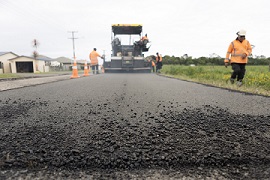Steve Killeen: Ending construction’s boom and bust
23/07/2018

Steve Killeen, CEO of our New Zealand division, recently appeared in the New Zealand Herald to talk about the state of the construction industry:
You don't have to look too hard to see how vital construction is to New Zealand or the serious challenges it faces. The sector employs 250,000 people and accounts for about 6 per cent of GDP. But it is also defined by a boom and bust cycle whose costs can be expected to rise, which challenges the strong economy and future infrastructure we want.
The sector is expected to reach $42 billion in investment over the next 12 years. We will need construction to deliver the sustainable buildings, transport links and modern utilities that will be at the heart of our future communities. But for that to happen, the way we see the sector, and how it is used, will also need to dramatically change.
The current way of doing things is disruptive for the industry and its customers. It has damaged quality and productivity. Low margins and contracts that transfer a high level of risk create knife-edge, unsustainable terms. Investment in research and development is low. We have a legacy of bad, leaky buildings that no one wants to repeat.
I've been in the industry 30 years and have read more than 20 reports on its challenges. I know what makes the difference in enabling change is the commitment of the industry's leaders, including from providers and purchasing organisations, like government.
Usually industry problems are seen as stories about individual businesses or customers. But just as we recognise sectors like dairy and tourism, we need to wake up to construction's place in our future as well.
Other countries are already moving to face the same challenges. The recent Farmer review of the UK construction labour model describes a sector there that operates in a "survivalist" environment of low capital reserves, uneven demand, outdated procurement and resistance to change.
Just last month, a New South Wales government action plan identified similar problems and called for a long term template for driving quality, innovation and cost effectiveness.
So what can we do?
First, we need best practice for procurement. Standardised modern contracts would protect efficiency but recognise value as well as price. We have seen low margins and low risk allowance compound to destroy wealth. By contrast, more enlightened collaborative agreements have seen major projects like Wellington's Memorial Park Alliance, the Christchurch horizontal rebuild and Waterview Tunnel successfully delivered.
Second, we need to see procurers value social benefit. Downer, for example, has worked with Te Puni Kokiri to develop a successful Maori leadership programme. Through several initiatives with the Ministry of Social Development, we have helped over 1000 people move from unemployment into work.
Third, as the major purchaser of infrastructure, the Government can help shape a more sustainable environment. History shows boom and bust damages job security, skills development and long term investment. The Government is well placed to break this cycle. The country will be best served and taxpayers will get a better deal if we level the workload. Making this happen requires a unified, cross-party approach.
Fourth, we need research and development. The sector can build a better future. It can bring in new technologies and commercialise New Zealand creativity. But all this needs investment. A 10 per cent gain in construction delivers an estimated extra 1 per cent of GDP, yet our sector productivity lags behind other developed countries.
Finally, we need to respect our people as an industry and a community. Construction is at the heart of the future we want. I see this as a time of opportunity as well as challenge. Success will turn on leaders stepping up and on a high-level business and government strategy.
Closer to the ground, I'd also urge respect. Slow down the next time you come to a construction site and say kia ora to the men and women in high-vis jackets you see working there: they are doing important work for us all.
Read more: https://www.nzherald.co.nz/nz/news/article.cfm?c_id=1&objectid=12087020
Categories
Related articles
-
 02/04/2024
02/04/2024Connor Ryan-Wills' Success Story
Read more -
 18/03/2024
18/03/2024Māori leaders graduate with bachelor’s degrees from Otago Polytechnic
Read more -
 14/03/2024
14/03/2024Q&A with Jarrod Telford - Downer's Pou Matua
Read more -
 07/03/2024
07/03/2024International Wāhine Day at Te Ara O Te Ata (Mt. Messenger) Alliance
Read more -
 12/12/2023
12/12/2023A beacon of innovation
Read more -
 28/11/2023
28/11/2023Greening the Tracks: Link Alliance's Sustainable Rail Network Transformation
Read more -
 20/11/2023
20/11/2023Global award for Milford Road Alliance
Read more -
 27/10/2023
27/10/2023Road Science launches Bio Bind - a pioneering innovation for sustainable roading
Read more







